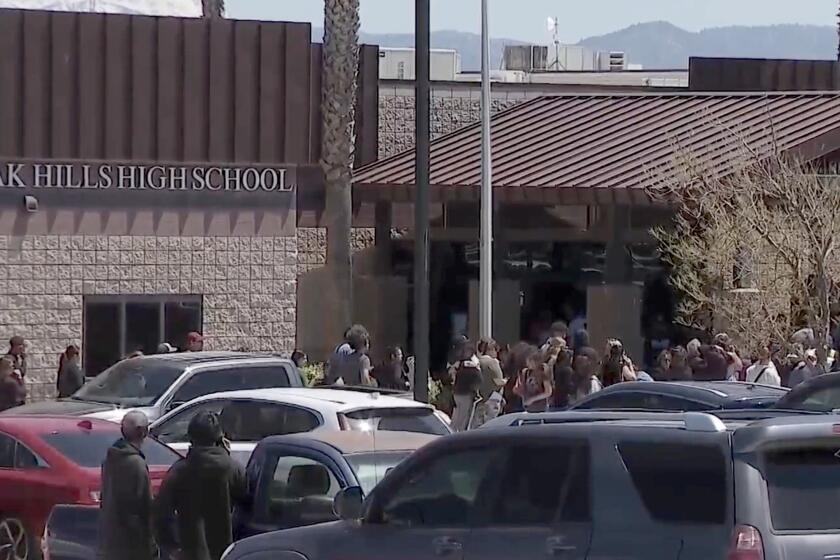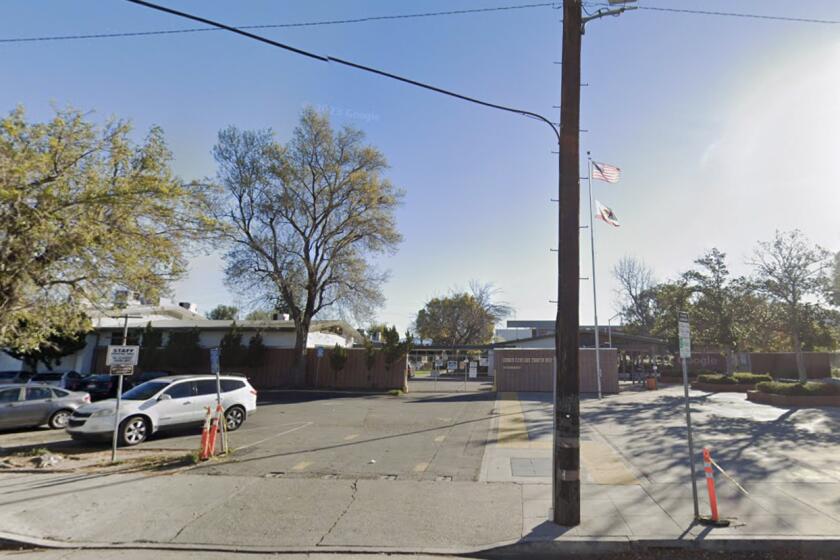San Diegans take up challenge of aiding Afghanistan
It began with a visit by a San Diego businesswoman who volunteered at an Afghan refugee camp in Pakistan after the Taliban was pushed from power in 2001.
Fary Moini, the owner of two tuxedo shops, was shocked by the poverty and despair at the overcrowded site just across the border from Afghanistan, and moved by the sorrow and confusion she saw in the eyes of the children.
When she returned home, she appealed to her fellow Rotary Club members to help do something -- anything -- for the Afghans.
Steve Brown, a prominent attorney and longtime member of the La Jolla Golden Triangle Rotary Club, took up the challenge, and within months Brown and his club had raised $240,000 to build a school in war-torn Jalalabad.
The school, now serving 3,000 boys and 1,500 girls, was just the start in what has become a multifaceted effort by San Diego residents and institutions to upgrade the educational and medical facilities in Jalalabad and the surrounding Nangarhar region.
After the school project, Brown raised money to build a dormitory for female students and a three-bedroom guest house for visiting teachers, and to pay the salaries of eight instructors.
A computer lab was established at Nangarhar University (an e-mail appeal brought $70,000 from San Diego Padres owner John Moores). At the Rotary Club’s urging, San Diego and Jalalabad established a sister-city relationship, and Jalalabad’s mayor came to San Diego to meet his counterpart.
“Everything is interconnected,” Brown said.
Spinoff projects have encompassed San Diego State University and UC San Diego. Brown and San Diego State officials secured $2 million from the World Bank to work with the faculty at Nangarhar University.
Since 2005, professors of engineering, health science and English as a second language have traveled from Nangarhar to San Diego State for training and some sightseeing. Thirty will arrive this summer.
The region’s top doctor recently spent a month in San Diego discussing community health needs -- and got to watch his first National Football League game.
“The Afghan people are famous for their hospitality,” said Dr. Ajmal Pardis, public health director for Nangarhar province and chairman of the drive to eradicate polio in Afghanistan. “But what I found here is much higher than that.”
With a grant from the U.S. State Department, schools in San Diego, Chula Vista, San Marcos and Blythe are now linked by computer with schools in Jalalabad, and students are exchanging e-mails.
Brown, Moini and others involved in the Afghanistan outreach say their efforts are just the beginning.
Plans call for more buildings, more medical supplies and equipment shipped to Jalalabad, more training for professors and doctors, and more U.S. schools linked to their counterparts in Afghanistan.
In a country as desperately poor and needy as Afghanistan, these private efforts may not do much to improve overall living conditions. But Moini, an Iranian-born nurse, takes her motto from Mother Teresa: “We cannot all do great things, but we can do small things with great love.”
At Mission Hills High School in suburban San Marcos, members of the Global Awareness Club are exchanging e-mails with students in Jalalabad. A recent topic was the approach of spring in both countries. Ajab Khan wrote: “Spring changes earth entirely and gives beauty to the earth.”
Shadia Mansour, 17, a senior at Mission Hills, was impressed.
“It’s kind of cool to think you have some of the same views as somebody halfway around the world,” she said.
Access to the Internet, Brown said, is a way to break down the isolation felt by Afghans, which can breed suspicion and make teenagers vulnerable to extremist rhetoric.
“In the long term, it’s how you fight terrorism,” he said. “Somewhere somebody will say, ‘Death to America!’ and an Afghan kid will say, ‘Hey, you’re talking about my computer pal!’ ”
Soraya Hoberman, 17, thought it was important to tell the Jalalabad students that she’s Jewish.
“It’s who I am, and I wanted them to know that in case that gave them problems,” she said. “It didn’t, and now I’m making a bond with people who have had a very tenuous relationship with my people.”
With a password, students in both countries can sign on to a website at school or home and post comments, much like at other social networking sites.
Kaylee Bieraugel, 16, has been exchanging e-mails with Said Nomon about Christmas and Eid, the Muslim holiday that marks the end of Ramadan.
“The media builds up Afghanistan as disconnected and not good,” she said. “But when we talk to the kids there about their hopes and dreams, they seem just like us.”
Although it is far removed from the Afghan capital of Kabul, Jalalabad is not immune to the violence brought by the struggle for control between the Taliban and U.S.-backed Afghan forces.
Still, Brown has made eight trips to Jalalabad and Moini 10, all without serious trouble. “We’re under the radar,” Brown said. “We’re not rich targets.”
The San Diegans have drunk tea with tribal and religious leaders -- and even a Taliban chief. Local support, particularly from the new Jalalabad Rotary Club, is strong, they said.
“We’ve never paid a penny in bribes,” Moini said.
Among the ambitious plans: building a bridge over the Kabul River, which during flood season blocks villagers from schools and health clinics.
Pardis would like help in training health professionals to practice preventive medical care in isolated villages. Afghanistan is one of the few nations where polio still exists, and it has a high infant mortality rate.
Jalalabad’s needs are enormous, Brown said, and sometimes it seems they are multiplying faster than help can arrive.
“It’s like shoveling sand off the beach,” said San Diego architect Rick Clark, who designed the La Jolla Golden Triangle Rotary School in Jalalabad. “You have to start somewhere.”
--
More to Read
Start your day right
Sign up for Essential California for news, features and recommendations from the L.A. Times and beyond in your inbox six days a week.
You may occasionally receive promotional content from the Los Angeles Times.






